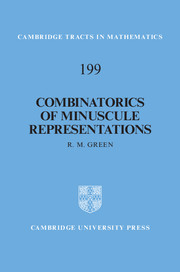Book contents
- Frontmatter
- Contents
- Introduction
- 1 Classical Lie algebras and Weyl groups
- 2 Heaps over graphs
- 3 Weyl group actions
- 4 Lie theory
- 5 Minuscule representations
- 6 Full heaps over affine Dynkin diagrams
- 7 Chevalley bases
- 8 Combinatorics of Weyl groups
- 9 The 28 bitangents
- 10 Exceptional structures
- 11 Further topics
- Appendix A Posets, graphs and categories
- Appendix B Lie theoretic data
- References
- Index
5 - Minuscule representations
Published online by Cambridge University Press: 05 February 2013
- Frontmatter
- Contents
- Introduction
- 1 Classical Lie algebras and Weyl groups
- 2 Heaps over graphs
- 3 Weyl group actions
- 4 Lie theory
- 5 Minuscule representations
- 6 Full heaps over affine Dynkin diagrams
- 7 Chevalley bases
- 8 Combinatorics of Weyl groups
- 9 The 28 bitangents
- 10 Exceptional structures
- 11 Further topics
- Appendix A Posets, graphs and categories
- Appendix B Lie theoretic data
- References
- Index
Summary
In Chapter 5, we will explain how to use full heaps to construct minuscule representations of simple Lie algebras. It will turn out in Section 6.6 that every minuscule representation can be constructed in this way.
We start by recalling the usual construction of simple Lie algebras over ℂ via generators and relations (Theorem 5.1.1) and the construction of their finite dimensional irreducible representations (Theorem 5.1.2). Certain of these representations are the eponymous minuscule representations; these are classified in Theorem 5.1.5.
Theorem 5.2.14 shows how to construct finite dimensional irreducible modules VF from certain finite subheaps F of full heaps. The modules are isomorphic if and only if the heaps are isomorphic, and the weight vectors of the modules are easily described in terms of the heap structure.
Section 5.3 proves two very useful results. Theorem 5.3.13 shows that any full heap over an affine Dynkin diagram is periodic, and that the periodicity is intimately related to the lowest positive imaginary root of the associated affine root system. Theorem 5.3.16, which we call the “Trivialization Theorem”, is a seemingly technical result about the action of the Weyl group on pairs of proper ideals in a full heap. However, it will have many applications throughout this book.
Section 5.4 discusses the reflections in affine Weyl groups, and Theorem 5.4.13 explains how one can explicitly describe the action of an arbitrary reflection on the proper ideals of a full heap.
- Type
- Chapter
- Information
- Combinatorics of Minuscule Representations , pp. 89 - 117Publisher: Cambridge University PressPrint publication year: 2013

